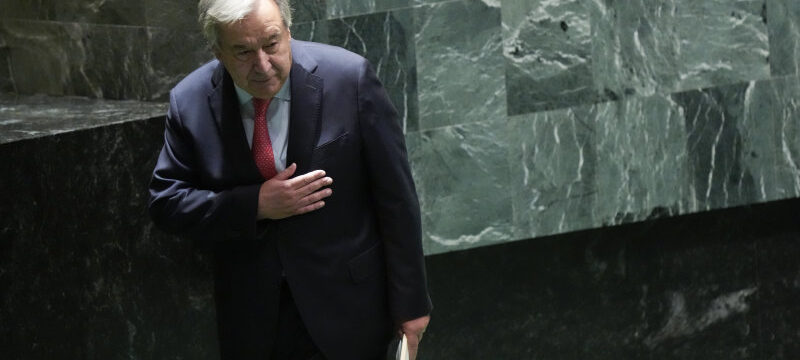Save articles for later
Add articles to your saved list and come back to them any time.
New York: Insisting that international cooperation is critical, the United Nations chief has delivered a dire warning to leaders from across the world, declaring the planet is becoming unhinged with mounting global challenges and geopolitical tensions.
Addressing presidents and prime ministers, monarchs and ministers at the opening of the UN General Assembly’s high-level meeting, Secretary-General Antonio Guterres ticked off a list of “existential threats” the world is facing, from climate change to disruptive technologies like artificial intelligence.
“Our world is becoming unhinged. Geopolitical tensions are rising. Global challenges are mounting. And we seem incapable of coming together to respond,” Guterres told the people who run the world’s nations. He said that the United Nations – and the ways that countries cooperate – must evolve to meet the era.
United Nations Secretary-General Antonio Guterres acknowledges the audience applause after addressing the 78th session of the UN General Assembly on Tuesday.Credit: AP
“The world has changed. Our institutions have not,” Guterres said before the opening of the UN General Assembly’s General Debate. “We cannot effectively address problems as they are if institutions don’t reflect the world as it is. Instead of solving problems, they risk becoming part of the problem.”
All this is taking place. Guterres said, as the world is making a “chaotic transition” and rapidly moving from a brief period of “unipolarity” – domination by a single power, the United States – towards a multipolar world with many power centres. That is, he said, positive in many ways.
Advocating an effective ‘multipolar’ world
Guterres said a multipolar world needed strong, effective multilateral institutions where all countries work together to solve the world’s challenges. But the current institutions formed on the ashes of World War II, including the UN and its powerful Security Council and key global financial institutions, have not changed enough.
Ukraine President Volodymyr Zelensky, left, meets with United Nations Secretary-General Antonio Guterres, at the UN headquarters on Tuesday. Credit: AP
If these institutions were not reformed to reflect the world today, Guterres said the alternative is not maintaining the status quo; it is “further fragmentation”. He added: “It’s reform or rupture”.
Guterres warned that divides are deepening, among economic and military powers, between countries in the developed North and developing South, and between the global West and East.
“We are inching ever closed to a great fracture in economic and financial systems and trade relations,” he said, “one that threatens a single, open internet. [One] with diverging strategies on technology and artificial intelligence, and potentially clashing security frameworks.”
He said the world needed action now – not merely more words – and compromise to tackle the challenges and adopt needed reforms.
Guterres sharply criticised Russia’s invasion of Ukraine, telling leaders it is “Exhibit A” of countries breaking their pledge to uphold the US Charter’s pledge for peace – and the mandate to guarantee the sovereignty and territorial integrity of all member nations.
This year’s week-long session, the first full-on meeting of world leaders since the COVID-19 pandemic disrupted travel, has 145 leaders scheduled to speak. It’s a large number that reflects the multitude of crises and conflicts.
The absence of leaders from the four Security Council powers has caused grumbling from developing countries who want major global players to listen to their demands – including for money to start closing the growing gap between the world’s haves and have-nots.
At a two-day summit to kick-start action to achieve the goals, Guterres pointed to grim findings in a UN report in July. He said 15 per cent of some 140 specific targets to achieve the 17 goals were on track. Many were going in the wrong direction, and not a single one was expected to be achieved in the next seven years.
The wide-ranging goals include end extreme poverty and hunger, ensure every child gets a quality secondary education, achieve gender equality and make significant inroads in tackling climate change – all by 2030.
At the current rate, the report said, 575 million people will still be living in extreme poverty and 84 million children won’t even be going to elementary school in 2030 – and it will take 286 years to reach equality between men and women.
Leaders from the 193 UN member nations adopted by consensus a political declaration that recognises the goals are “in peril”.
AP
Most Viewed in World
From our partners
Source: Read Full Article


